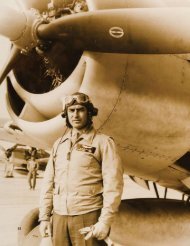Killing Roswell - Future Theater
Killing Roswell - Future Theater
Killing Roswell - Future Theater
Create successful ePaper yourself
Turn your PDF publications into a flip-book with our unique Google optimized e-Paper software.
Instead, he went to Albuquerque to start a new life and became<br />
a well-known newsman and features reporter at KOB radio<br />
and television there, retiring in 1997. According to Joyce,<br />
he never spoke of <strong>Roswell</strong> for decades after the UFO crash, and<br />
it wasn’t until after he had retired from KOB that he revealed<br />
the rest of the story about Mack Brazel finding bodies in addition<br />
to wreckage to Don Schmitt and me in 1998. Frank Joyce<br />
passed away in 2008.<br />
For obvious reasons, the military personnel who knew the<br />
truth of what really happened at <strong>Roswell</strong> and were involved in<br />
the UFO recovery operations, either directly or indirectly, were<br />
the easiest people for the military authorities to silence. With<br />
direct authority and control over their lives through the channels<br />
of command, it was relatively obvious.<br />
The <strong>Roswell</strong> airbase went in a lockdown mode to control entrance<br />
and exit soon after authorities realized what they were<br />
dealing with, and the base remained in lockdown, from what<br />
we have been told, for a period of about a week. Even airmen<br />
on the base who were not involved in the UFO recovery could<br />
sense that something big was taking place.<br />
But with <strong>Roswell</strong> Army Air field being our country’s first SAC<br />
base whose mission it was to drop the atomic bomb in time<br />
of war, they knew not to ask too many questions nor to discuss<br />
their activities on the base with their families when they<br />
went home. Although we have received anecdotal accounts of<br />
at least three suicides taking place on the base at the time of the<br />
incident as well as several off-base hunting accidents occurring<br />
soon thereafter, we have so far been unable to verify these.<br />
Officers were briefed separately, but the bulk of the airmen on<br />
the base—the enlisted men, including NCOs—were herded into<br />
the large hangars at the south and east end of the base, squadron<br />
by squadron, and unceremoniously read the riot act. As one<br />
squadron commander put it to his assembled troops: “Whatever<br />
you’ve been hearing lately, it’s not true. There’s no flying<br />
saucer. Nothing<br />
has happened!<br />
But if<br />
you think you<br />
want to keep<br />
talking about<br />
it or learning<br />
more about it,<br />
you can read<br />
all about it in<br />
Leavenworth!”<br />
Faced with<br />
the choices of a<br />
stiff prison sentence<br />
at hard<br />
labor, a transfer<br />
to an undesirable<br />
duty location,<br />
a reduction<br />
in rank or<br />
The architect of the <strong>Roswell</strong> cover-up<br />
was most likely General Hoyt S. Vandenberg<br />
in Washington, D.C. and not General<br />
Roger M. Ramey in Fort Worth, TX.<br />
a dishonorable discharge—which in those days would forever<br />
remain a stain on one’s record—the message got through loud<br />
and clear. Combined with a natural sense of honor, duty, and<br />
love of country all wrapped up in a blanket of national security,<br />
most of the men and women of the 509 th , members of America’s<br />
Greatest Generation, remained silent for the rest of their lives<br />
and took what they knew with them to their graves.<br />
What we have found interesting in attempting to interview military<br />
witnesses to the 1947 events, however, is how they break<br />
out as to who is most likely and least likely to talk to us. From<br />
the hundreds and hundreds of interviews we have conducted<br />
over the years, some general comments can be made. With a few<br />
exceptions, those least likely to talk have been the officers, including<br />
NCOs, and the higher the rank, the less the chance.<br />
Brigadier General Arthur Exon and Lieutenant Colonel Philip<br />
Corso are two exceptions from this group who have gone on<br />
the public record. Among the enlisted ranks, an interesting dichotomy<br />
became apparent when it came to who was likely to<br />
talk to us—and who would not—that had nothing at all to do<br />
with rank.<br />
We found that those who remained in service long enough to<br />
retire on a military or government pension have by and large<br />
refused to talk. Even when told of Air Force Secretary Sheila<br />
Widnall’s 1994 amnesty for <strong>Roswell</strong> veterans, most still refuse<br />
to budge: “I’m retired, and I like it that way.”<br />
The most common response we receive from members of this<br />
group, however, is simply, “I don’t remember anything.”<br />
Air Force Lt. Arthur Philbin of the 509 th Bomb Group<br />
at <strong>Roswell</strong> Army Air Field was employed by the Air<br />
Force to apply the hammer to local civilians when<br />
Sheriff Wilcox refused.<br />
UFO Vol. 24, No. 3<br />
53



